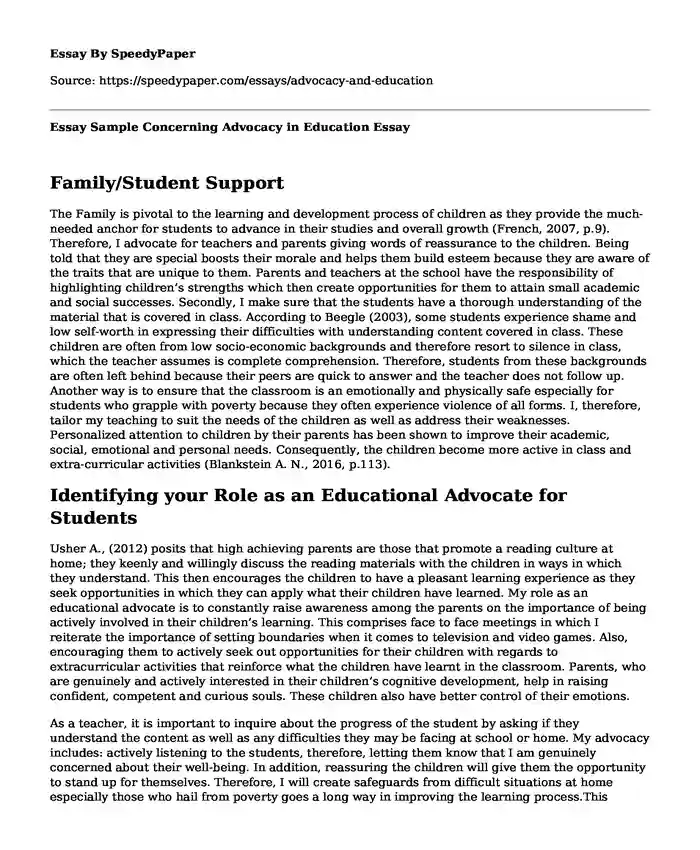Family/Student Support
The Family is pivotal to the learning and development process of children as they provide the much-needed anchor for students to advance in their studies and overall growth (French, 2007, p.9). Therefore, I advocate for teachers and parents giving words of reassurance to the children. Being told that they are special boosts their morale and helps them build esteem because they are aware of the traits that are unique to them. Parents and teachers at the school have the responsibility of highlighting children’s strengths which then create opportunities for them to attain small academic and social successes. Secondly, I make sure that the students have a thorough understanding of the material that is covered in class. According to Beegle (2003), some students experience shame and low self-worth in expressing their difficulties with understanding content covered in class. These children are often from low socio-economic backgrounds and therefore resort to silence in class, which the teacher assumes is complete comprehension. Therefore, students from these backgrounds are often left behind because their peers are quick to answer and the teacher does not follow up. Another way is to ensure that the classroom is an emotionally and physically safe especially for students who grapple with poverty because they often experience violence of all forms. I, therefore, tailor my teaching to suit the needs of the children as well as address their weaknesses. Personalized attention to children by their parents has been shown to improve their academic, social, emotional and personal needs. Consequently, the children become more active in class and extra-curricular activities (Blankstein A. N., 2016, p.113).
Identifying your Role as an Educational Advocate for Students
Usher A., (2012) posits that high achieving parents are those that promote a reading culture at home; they keenly and willingly discuss the reading materials with the children in ways in which they understand. This then encourages the children to have a pleasant learning experience as they seek opportunities in which they can apply what their children have learned. My role as an educational advocate is to constantly raise awareness among the parents on the importance of being actively involved in their children’s learning. This comprises face to face meetings in which I reiterate the importance of setting boundaries when it comes to television and video games. Also, encouraging them to actively seek out opportunities for their children with regards to extracurricular activities that reinforce what the children have learnt in the classroom. Parents, who are genuinely and actively interested in their children’s cognitive development, help in raising confident, competent and curious souls. These children also have better control of their emotions.
As a teacher, it is important to inquire about the progress of the student by asking if they understand the content as well as any difficulties they may be facing at school or home. My advocacy includes: actively listening to the students, therefore, letting them know that I am genuinely concerned about their well-being. In addition, reassuring the children will give them the opportunity to stand up for themselves. Therefore, I will create safeguards from difficult situations at home especially those who hail from poverty goes a long way in improving the learning process.This entails being sensitive to their feelings, knowing their names and learning about their specific talents and progress. Accepting each student with their strengths and shortcomings helps the children pursue their interests in the class. Use of reassuring mantras each morning boosts self-confidence. Advocacy only becomes effective when staff, administration, and parents work collaboratively in advancing class activities and learning.
References
Beegle, D. ( 2003). Overcoming the silence of generational poverty. Talking points.
Blankstein, A. N. (2016). Excellence through Equity: Five principles of courageous leadership to guide achievement for every student. Alexandria, Alexandria: VA: ASCD.
Bruce, T. (2004). Developing learning in early childhood. London: Paul Chapman.
CAPTULSA. (2012-2016). Press Kit. Retrieved from Cap Tulsa: http://captulsa.org/press-kit/
Eger, A. (2016). Budget crisis: Proposal would cut 142 Tulsa public schools teaching positions, Retrieved from http://www.tulsaworld.com/news/education/budget-
French, G. (2007). Children’s early learning and development. A research paper , NCCA, Dublin.
Katess, B. (1992). Sesame street we’re different, we’re the same. New York: Random House.
Keeping, J. (2016). Quick facts about refugee resettlement in Oklahoma. Retrieved from http://newok.com/quick-facts-about-refugee-resettlement-in-oklahoma/article/5488014/2
Usher A., (2012). What roles do parent involvement, family background, and culture play in student motivation? Center on Education Policy.
Winser A., Abar B., Feder M. A., Schunn C. D., and Rubio A. O. (2007). Private Speech and Executive Functioning among High-Functioning Children with Autistic Spectrum Disorder. Springer science and Business Media, LLC.
Cite this page
Essay Sample Concerning Advocacy in Education. (2018, Jan 07). Retrieved from https://speedypaper.net/essays/advocacy-and-education
Request Removal
If you are the original author of this essay and no longer wish to have it published on the SpeedyPaper website, please click below to request its removal:
- Free Essay on Being a Good Student
- Representation of Immigrants in America Today
- Business Model Generation Paper, Example for Free
- Essay Example: Impact of Physical Activity on the Respiration
- An Analysis of the Change Context, Essay Sample in Hotel Management
- Economics Essay Example on the City of Merced
- Reflected Best Self - Leadership Development Essay Example
Popular categories





